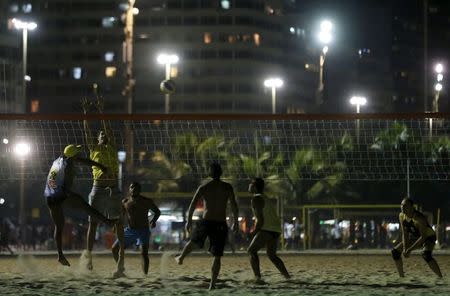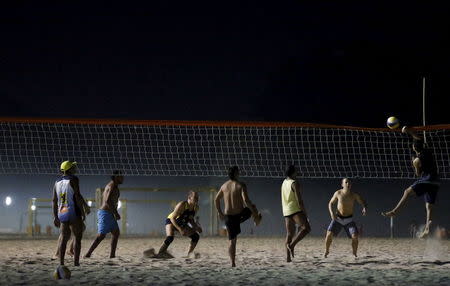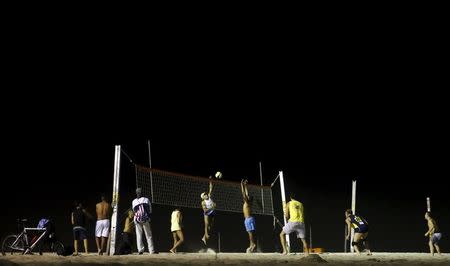At Rio's 'midnight' Olympics performance may suffer
By Stephen Eisenhammer RIO DE JANEIRO (Reuters) - Rio de Janeiro may have a penchant for late-night parties, but scheduling of events past midnight at next year's Olympic Games could be a real test of endurance for the world's greatest athletes. Academics and athletes fear the late hour could hinder performance and result in fewer world records and displays of athletic mastery at Rio 2016 as competitors struggle to adjust training and sleep patterns. The schedule, partly the result of broadcast contracts, will see some swimming finals, beach volleyball and basketball matches run into the early hours. After media, warm down, drug testing and the taxi home, athletes might not be in bed until 3-4 am local time. Athletics is also due to be held late, with finals finishing after 11 pm. "It's going to be a challenge and could impact on times," said Marc Woods, a former British swimmer who won 12 Paralympic medals in five separate Games. What will be the latest finals at an Olympics in recent memory has brought into focus the tension between sponsors, broadcasters and the sports they support and televise. While viewing figures are vital for the funding of nearly all Olympic sports, athletes and fans have long expressed concern over the rising influence of television and advertisers. "It kind of stinks. They're not really looking out for the athletes," said Dara Torres, a former U.S. swimmer who won 12 Olympic medals across five Games between 1984 and 2008. Scheduling is the responsibility of the International Olympic Committee (IOC), but key broadcasters such as America's NBC and Brazil's TV Globo have significant influence. Rio de Janeiro is one hour ahead of New York or Washington, D.C. and the timetable for swimming, beach volleyball and basketball will fit into so-called "prime time" of 8-11 pm Eastern Time. It also suits Brazil's TV Globo, being around the same time football is usually shown, and will not interfere with the broadcaster's flagship nightly novela, or soap. NBC, owned by Comcast Corp, is the biggest player in Olympic broadcasting having paid $12 billion over two contracts to air all Games between 2014 and 2032. It has been on the receiving end of criticism before, notably for delaying broadcast of London 2012 events. NBC declined to comment and Globo did not immediately respond to requests for comment. The IOC said it believed the schedule "will allow the athletes to compete at their best and to showcase their performances to a truly global audience." NIGHT SHIFT A recent paper by Elise Facer-Childs and Roland Brandstaetter at the University of Birmingham found that depending on the time of day an athlete's stamina can vary on average by as much as 11 percent. Such a gap is significant. In the men's 100 metre freestyle swimming at London 2012, just 2 percent was the difference between last place and a gold medal. The study found that performance, as measured by a stamina test, for most athletes peaked in late afternoon and early evening while fading into the night and early morning. This can be offset by changing when you sleep and train, but only to an extent. "You have to take into account sleep quality. Night shift workers don't sleep as well, so if athletes are getting to bed in the early hours that will have an effect," Facer-Childs said. The Olympic schedule has caused controversy before, with swimming finals in Beijing criticized for being held in the morning and heats the evening before. Despite swimmers generally being faster in the afternoon, Michael Phelps would go on to win eight golds and set seven world records. Previous Olympics have been on the hook for other factors that were seen to negatively impact athletic performance, including altitude at Mexico City in 1968 and heat at Atlanta in 1996. But for some athletes the late nights are just another challenge that comes with the job. "It might not be my preferred time to play, but I am such a huge advocate for beach volleyball, that if playing late gains more supporters for it, I’m game," said Kerri Walsh Jennings, U.S. beach volleyball player and three time Olympic gold medalist. Athletes noted everyone will be competing at the same time and should be impacted equally, while adrenaline should help overcome disadvantages. But any sense that considerations such as broadcast schedules could be given the priority, resulting in fewer record-breaking performances, appears to go against the Olympic spirit and its mandate to promote sporting excellence. "When you're in a situation like the Olympics you want the athletes to be put first," said Torres. "We're the ones who are there, we've done all the work." (Additional reporting by Steve Ginsburg; Editing by Mary Milliken and Tomasz Janowski)

 Yahoo Sport
Yahoo Sport 








































